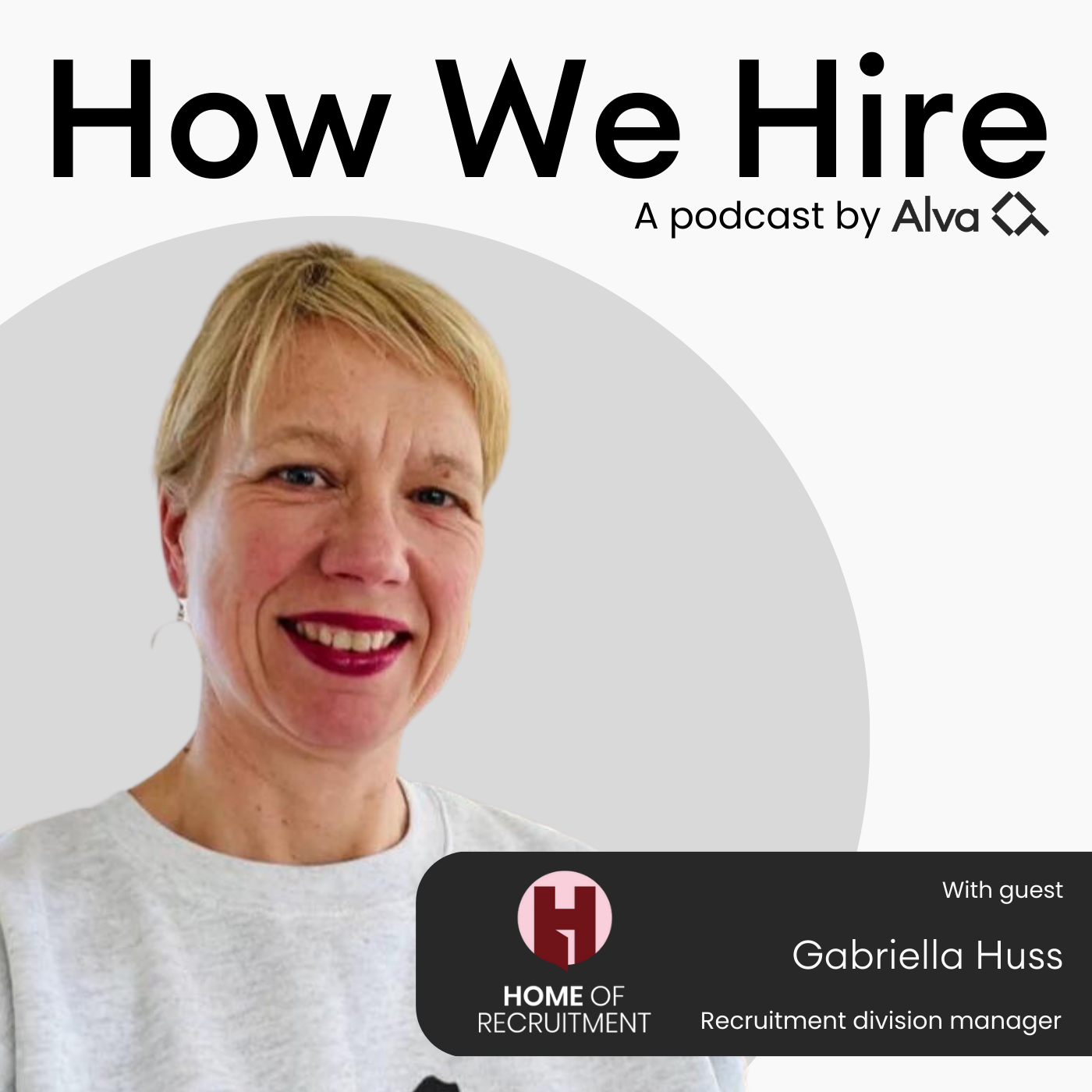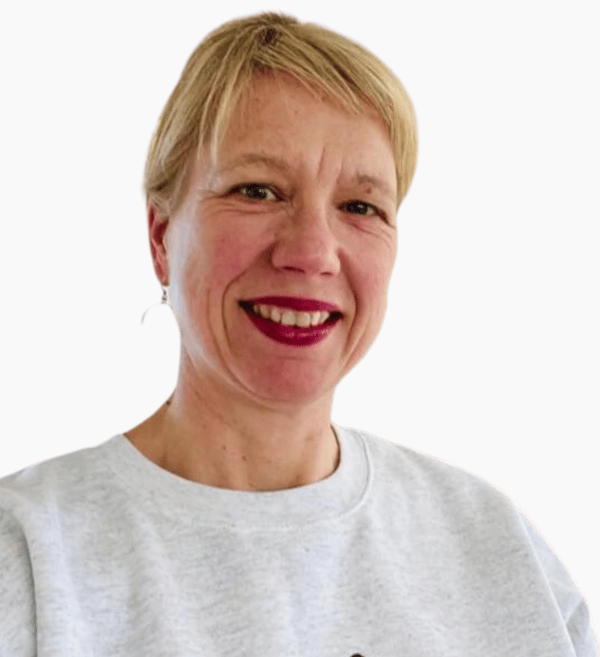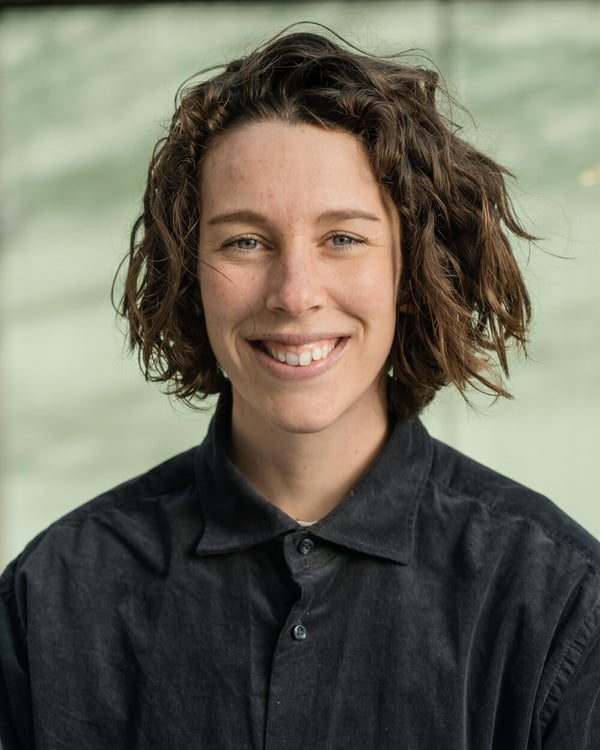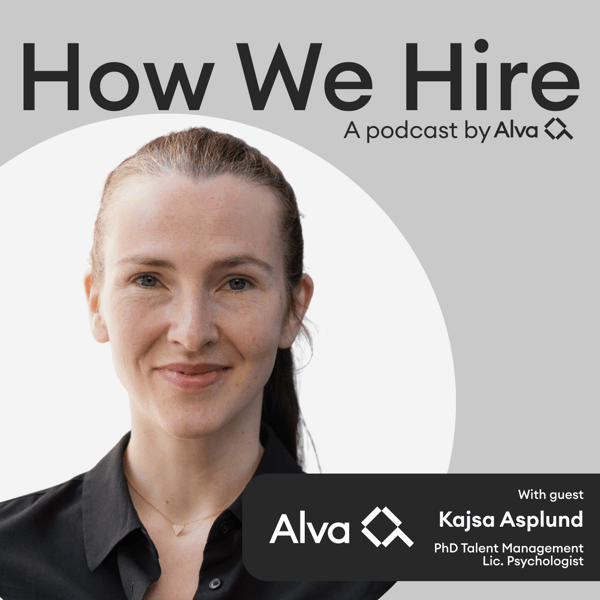How We Hire Podcast Episode 20 Transcript
Linnea (00:00):
If Santa Claus was a recruiter... How often you start a sentence like that? But if Santa Claus was a recruiter, the naughty list would have cover letter, see the gut feeling and replacing the new person just with the exact same person that just left. And the nice list, the methods that will get Christmas presents are the more screening questions, evidence-based assessments, structured interviews, but also I think the red thread is methods that can measure the competence that are relevant for the job.
(00:48):
Welcome to How We Hire a podcast by Alva Labs with me, Linnea, licensed Psychologist and Head of People. This show is for all of you who hire or just find recruitment interesting. In every episode I will speak with thought leaders from across the globe to learn from their experiences and best practices within hiring, building teams and growing organizations.
(01:15):
Our guest on today's episode is Gabriella Huss from HOME of Recruitment. Gabriella has a long background in recruiting both leaders and specialists and across all different industries. Her passion is finding the right person with the help of competency-based approaches as well as the most modern and efficient tools available on the market always with both accuracy and fairness as guiding stars. So welcome to How We Hire Gabriella. So nice to have you.
Gabriella Huss (01:40):
Hi, glad to be here on the podcast today with you Linnea and Alva Labs. I'm very pleased to give my perspective on recruitment and how we work and then our opinions about how to evaluate and to assign the right person to the right position with the good process.
Linnea (01:59):
Perfect. And I think maybe we should start from the start. For those that don't know who HOME of Recruitment, can you describe what you do?
Gabriella Huss (02:07):
So we are consultancy company and we started out for a little bit more than five years. We are based in Stockholm and also in the southern regions of our country. But we are a consultancy firm that we see us as experts within competence based recruitment processes and we offer different solutions and guidance and I would say advice when it comes to that kind of work within the recruitment business. And we do that within interim management with the services to hire or to intervene services within TA, also Talent Acquisitions, consultancy services to hire or to lease. And we also have a wide range of courses and educational support within competence-based recruitment and also workshops within that.
(03:03):
And we do that both in physical classroom, so to speak, courses, but in a large extent online courses, digital services. And my main occupancy and assignment is to do whole recruitment processes from taking the job description and to set all the competencies necessary to fill in and to find candidates, to evaluate candidates and to finalize with just a small group of private candidates. And we also do leadership assessment in regard to different organization maybe doing their recruitment processes on their own that they don't have the tools that we can offer and we help them in guiding them in how to select the right candidate.
Linnea (03:58):
It feels like you are like front-runners when it comes to professionalizing the recruitment and talent acquisition industry almost.
Gabriella Huss (04:06):
Yes, I would say that our mission and our aim is to make a difference on the working, so to speak, market and how to include and diversify how we select competence to organizations. And we really would like to help and to advise into a more wider perspective. And mostly I would say a more including and diverse way to look upon how competence can be evaluated because they will often lean into old perspectives and old views on what's validated to correlate to performance. And we stand on other grounds very much leaning to the science within the working and industrial organizational psychology, I would say.
Linnea (05:04):
I think you mentioned competency based way of working and if I'm going to be a little bit critical, it feels like a lot of companies are calling their processes competency based and throwing a lot of different stuff in there and saying that as long as we work competency based everything is great. But I would say that the quality and the variety is really wide. So can you just describe what is competency-based recruitment in your mind and why should that be the way forward?
Gabriella Huss (05:35):
Competence as value or a word to describe it contains so much and I would say competence includes what we call readiness. Readiness I would include with experience and knowledge, but also competence has a lot to do with your personal traits so to speak, your behaviors within a working position. So how you do things, how you act, how you relate, all those things will in a very large extent lead into how well you fit into a position and also an organization and all that comes with the challenges connected to the position or the role. So to work with a competence-based recruitment process, you really need to lean into define those behaviors that are critical. Also, it's really how to define the real description, not only the hard skills so to speak, what you need to know, what kind of experience you need to have and that differs widely [inaudible 00:06:46] compared to another.
(06:48):
But also defining and really leaning to what kind of behaviors are very critical for this position. I would say I'm still kind of surprised that's something that in many cases when I lean into discussions with clients, it's something that you generalize those description very often and you are not really aware of what is a good or high performance, what is that contained of, what is it that our best managers do in their everyday kind of working performance or a salesperson or whoever it is. It's more that we lean into the background and experience and that is the answer to everything and it's not.
Linnea (07:40):
I guess it's easier to look at that and therefore you are more comfortable in talking about what experience, how many years, what education, what should they have done rather than as you say, the critical behaviors needed on the job. And if I can continue to be a little bit critical against this competency-based when you're working, because what I do like is of course you got to know what you're looking for and you got to assess the same thing so that you make the decisions on that same aspect. But to me, sometimes people are making it harder than it needs to be because they create a competency framework and it's even more floppy words. So in theory they think that they have made it more clear, but in reality I would argue that in some cases it actually makes it even more foggy. What's your take? Do you agree or no?
Gabriella Huss (08:33):
Yes, I've seen that as well. But I think maybe that when you do that it might be that you are not really aware of what is mostly critical to look upon when it comes to potential and behavioral traits or personal traits that leans into that specific position. You think that this kind of competence is really critical and essentially it's not that critical. It's other things that you need to really look into. And when it comes, for example, into... I will talk about this in a webinar in a couple of weeks, what's really essential to look upon or into when it comes to leadership potential I would say conscientiousness, emotional stability, for example, is two traits that really really shows within leadership science within this field of knowledge is really important to look upon and to be deepening in the whole process, I would say.
(09:39):
And maybe you look more into result oriented or being the innovative or very extrovert kind of person and it's probably not that will guide you in the most performing or highest or best performing person. So I think that maybe you set up a skill frame or demands on qualifications that might be too wide or too many and too many words when it comes down to quite basic things, when it comes to what's important and what's really valid and critical to assess in candidate profile.
Linnea (10:22):
So say that there are critical aspects we need to assess that are related both to who this person is, more scope skills, but of course always some background and experience as well. But if we just zoom out a bit. So how does one know what is critical? How do you find out what's critical in your assignments or how do you coach your clients to find what's critical?
Gabriella Huss (10:48):
Well I think to put a lot of effort into the job description is very essential in every recruitment process and not just have the assignment itself, the regular duties within the position described, it's really leaning to, we always interview several persons regard around the position to get the perspective of getting to know what does this position do, what are the challenges ahead, what are the circumstances around the position? And also to actually lean into what is a person that's really performing? If they have one on the side that's really performing in a good way, what is that person or those persons doing in their regular duties and how do they behave? So I would say to put in quite an effort in evaluating that specific position within that organization is essential and it comes down to how do they behave? In what sense does their personality come out?
Linnea (11:59):
I like the 360 perspective. So when you then know what you're going to assess, how would you say that one should go about assessing those competencies that you've realized are important?
Gabriella Huss (12:10):
As we do it in a new assignment, we do put up that you assign for the job by sending a CV or your LinkedIn profile, but then at once you need to answer certain questions that are very selected, connected to the job itself. So we don't ask for what you call a personal letter or a letter of application so to speak. We don't use that at all. And the next phase is to go within doing tests to look upon your personality, qualifications and traits and also to evaluate capacity or logical ability. So we do that in an early phase of all our recruitment processes. We reach out and candidates in a large extent will have to do tests. That's really to evaluate the potential in the start and that brings a lot to the recruitment that we can talk a lot about. But to do that in an early phase is really essential in all our processes, I would say.
Linnea (13:19):
So nailing the job description, screening questions, psychometric assessments early then what?
Gabriella Huss (13:27):
And then also to lean into not just having, I would say, general mapping. And when it comes to the psychometric testing, it's also a test profile that is very much assigned to the specific job position itself. So it's really a matching not only to competence or job description, it's also on the personal potential profile a matching. So that's really, really essential to set up that kind of mapping in the beginning of the process.
Linnea (14:01):
And then knowing a bit about your interview methodology and how you have your competencies and set up structured interviews based on that, can't you share a little bit about how that works?
Gabriella Huss (14:16):
Well, we set up an interview that's really a guidance in every specific recruitment process that we have. And I would say that we use a questionnaire that's really asking the candidate to describe a specific situation and that we asked the candidate to describe the situation and how they behaved, what happened, how did you get along, what happened to the organization around you? How did others react? What was the result on that? What could you have done in another way? What was your experience on this? What could you have done more or less of during that for example? So it's much more of letting the candidates describe a very concrete situation that has happened to them and that they describe on their behaviors regarding that situation.
Linnea (15:16):
In my mind, this makes so much sense. This is how we do our hiring process at Alva as well. But I think it's interesting, this is something that you and your coworkers at HOME of Recruitment were really preaching out there because it's still not given despite it being quite hammered in by theoretical and research-based studies and so forth. Why is it like this? Why does it take so long for practitioners to adapt to this more science-based place of working? What is the biggest challenge?
Gabriella Huss (15:51):
When you look upon a CV, it's more pragmatic. You can see what you have done in what kind of position, what kind of company or organization you've been in and you can grasp that easily to understand. But lean into personal traits and behaviors is more for many I think fluffy so to speak. And it takes quite an amount of practice and I would say experience and knowledge to lean into that and to be reliant on that evaluative or that base of facts because that's how I look upon it.
(16:32):
It's not a nice to have information. It's really a fact-based information that I use in my selections to be clear on that fact-based, what I mean is that it's based on extensive research. It doesn't say that I have 100% picture or a guarantee or saying that this person is like this, but I can tell that a person is more likely to act this direction than this direction and compared to other candidates, which is important because that's really my job to take out the candidates that are most likely to behave and act in the way that is necessary. And also that performs in a high extent to the role connected to the process of course.
Linnea (17:28):
So in your mind, what is the biggest challenge in hiring today that you want to fix?
Gabriella Huss (17:36):
I think the biggest challenge, there's so many, but I would say that I find myself many times in discussions with clients that they have already a mindset what the right candidate is. And it leans many times into, still, background and experience. And I would say that we need to have more when it comes to leaning into what is competence as a whole. We hire for skills but we let people go because of their behaviors and we need to see that it's really, really important to also evaluate and assess the personal traits.
(18:21):
And I think that when we do that, it also brings in that we include a lot of competence out there that are not really included in many processes. And we see that in the working environment how we look upon... Why is so many top positions in our largest companies, who has those positions? We know that answer at one of us. And why is it more difficult for people above 55 to get a new job? Why is it more difficult for people with another background in Swedish to get into the job market and so forth? And we just won't be able to afford that kind of perspective on competence.
Linnea (19:10):
So it sounds like the biggest issue is that we have our mind set on something that is really narrow and therefore miss out on a lot of talent.
Gabriella Huss (19:18):
Yes, I would say.
Linnea (19:21):
And my next question based on, because you say that we miss out and it's harder for some to get into job market, get certain positions. If you highlight some of the biases that you have stumbled upon or noticed organizations failing to even out the chances for, what would those biases be?
Gabriella Huss (19:41):
I would say the most common one is that you look upon who left and you kind of copy paste and you don't look into what's ahead. And the other one is the bias is looking into someone that's more likely going to act like me, finding the same person that I find is likable and because that's going to be easier. And also that a lot of science look upon still on educational background, years in experience within a field, the branch you've been working within. If you haven't been in that kind of business branch, you're not valid.
Linnea (20:28):
But I think that to your point on you fill the position with what was already in the position, I guess that could explain why there still are more men in higher leadership positions because it was the man leaving and therefore we unconsciously have our mindset for someone that's, we're going to replace A with another A or B with another B. And if that was the male and it's easier to fall into the habit of cloning what you already had.
Gabriella Huss (20:57):
Right. And also when it comes to leadership positions, like I said, that you have this mindset of what is really essentially giving performance when it comes to managerial positions is a mistake of mindsets. You really think that being this charismatic kind of person is most important and it shows that it's not and that's a mindset that we find that very common and we need to show that that's not really what's essentially important. And also to point out what that could bring in a more, I would say, negative way as well. So it's more of that we have this opinion or mindset or thoughts about what is correlating and valid when it comes to different, I would say, traits that those are not really connected with reality. It's a mistake of not really having the basis of facts connected to that.
Linnea (22:10):
I can't remember where I read this. So disclaimer that I can't link it to a source, but I read somewhere that people that talk more will be perceived as more leader-like-
Gabriella Huss (22:20):
Exactly.
Linnea (22:20):
... Regardless of what they say. So as long as you talk a lot, people are more likely to follow that person. And I think this is such a good and funny example of how our perception of something will not automatically be the same as what actually is the foundation for performance. I talk a lot so I think this is great, but that doesn't make me a great leader. But so we have established that there are problems in hiring, especially due to that people have these assumptions, how can we help improve hiring? What are the effective strategies to increase diversity, to reduce bias?
Gabriella Huss (23:03):
I would say that I think it's very, very important to look upon how we take on candidates in a process. For example, all our process are public and that that's one thing.
Linnea (23:18):
What do you mean with public?
Gabriella Huss (23:20):
We have them out on the market, on social media, everyone can apply.
Linnea (23:26):
Great.
Gabriella Huss (23:26):
We are not going looking for people under the radar so to speak. We don't work with hidden assignments and we know that a lot of companies out there do recruit and they recruit assignments that you and I will never see. We will not know that these assignments are out or those positions are, well, they're out there. And of course there are positions that need to, in some extent, be more secret, but I think, really, it's more of an old-fashioned way to look upon. I think that if we can be more public and show the whole working market what's available, we will also invite candidates that could be very much right and interesting to bring into a process that otherwise would not be able to apply. So that's one thing. Another thing is I see that a lot of process are run by tools that are not valid when it comes to evaluating. So you make a lot of mistakes so to speak in an early phase of a process.
Linnea (24:41):
And what would that be if you can exemplify?
Gabriella Huss (24:43):
Well I work with the client of mine that we have restructured their whole process of recruiting and I interviewed like 10 of their hiring managers on how they were recruiting and they say, "Well our most important tool is the personal letter, the letter of application that each candidate plays with. Okay?"-
Linnea (25:09):
This gives me a tummy ache.
Gabriella Huss (25:11):
Me a lot more than a tummy. It's just like, so what are you looking for in these letters then? What are you validating in those letters? Well, if they have a good sense of describing themselves, if they have mentioned how they relate to others, all kinds of stuff. There are so many studies regarding this that how we write has very little to do with how we going to behave and how we going to perform in this certain job description. So to evaluate on a letter of application is really that you can be sure that you will make a selection that is not valid to the position. You will have of course good candidates, but the question you need to ask is, how many did we say no? What have we not brought in here? What did we miss?
Linnea (26:12):
What I actually think is really interesting is that... To our early discussion of there are a lot of challenges, why isn't it changing faster? And there are companies using these type of methods and are probably making some bad hires but also some good hires just out of chance. You will get decent people every now and then. But why don't we see the need to do it differently? Why does it work for an organization or work in quotation marks, work for an organization to actually use the cover letter as the most important method for evaluating candidates?
Gabriella Huss (26:55):
We have had the possibility to be in a position of hiring competence and we are leaning into that. It's not that kind of way we're need or we can look upon competence ahead because it's going to be such a competitive market. So we really need to look into what's really essential, how to attract and to qualify our selection process.
Linnea (27:22):
I want to talk a little bit about how can you balance this being fair, having everything in the public using the right type of methods but also being accurate. Is there a trade-off in your mind? Can we be both accurate and fair?
Gabriella Huss (27:36):
Yes-
Linnea (27:36):
How?
Gabriella Huss (27:37):
... Definitely. So by using several methods, tools that are scientifically in the research connected to this field of business that we are in to use different methods and to really lean into what is the competence regarding the position and go back to really dig into that. That's really the basis of everything. If you skip that and not really in detail understand what is critical for a person coming into a position and how that will have to act and to behave, then you will not succeed in having the right selective candidate base in the end. Probably you will have candidates with the right experience and knowledge, but that's not even half of knowing if this is a person that will be performing. I see that so many times. So many times. We need to speak about this and to point out the valid grounds for that perspective on how to look upon competence.
(28:52):
That's the work to do. There is still a work to do and we see it in articles. Just this week there have been articles in media regarding the usage of psychometric tests. The questions steps a lot and then I go, "So what's the solution instead? Is it gut feeling? Is it CV? Is it the application letter?" We are in a business where we are not able and we're never going to be 100% sure of course, because we are actually looking into humans and we are very, very complex. We need to realize that and see that. But we do know that are methods better than other methods that both will show that we are fair and that we do include and we will, most of all, also present candidates that will perform. So it's really a win-win, I would say. In many candidates, dialogues that I have the response I get after and these great responses come even from candidates not getting the job.
(30:07):
They say, "I've never been in a process like this." So what do you think? "It's been very interesting. I've learned a lot and I feel that all of me is included in how I've been evaluated and selected through the process. I understand on what grounds you have been qualifying the final candidates and my way through this process." So it's really interesting to hear this also from the... And then I meet a lot of, the most I meet are people within leadership positions and they also say this, it's on all levels. It doesn't matter if you are a manager within a certain level or you're a specialist, a coworker, it doesn't really matter, it's the same. So I would say it's a win-win on candidate side and also when it comes to progress and performance and to really select the best candidates for a position to a company or an organization.
Linnea (31:11):
I think to your example, the best thing with the hiring in my mind is obviously when you find someone really great and they come into the organization and you see that they are performing and everyone really likes them and they like you back and it's a great fit. That's the rush. But I think to your example, the second-best thing is when a candidate that you reject reacts with a thank you. I think I can live off that for dates.
(31:38):
That's so great. Now jumping to a new topic or semi-new topic, but you were saying that in leadership positions people are really surprised by being evaluated in this way where they can come out as their entire selves and be evaluated for all their different aspects. In your mind, how should we go about a specialist hire versus a leadership role hire? What's the difference between those two approaches?
Gabriella Huss (32:09):
I would say that the approach is not the difference and the process itself is not different. But what you need to assess and look upon is going to be much different between the two because leadership is a profession itself and you really, really need to understand the challenges and the critical aspects within leadership. And that's a different thing in comparison to being a specialist. But I would say how to go upon in the process. I've been doing leadership recruitment for quite some years and when I started from colleagues and so on, I got the view of, "No, no, no, we cannot use tests on a leadership profiles. They will not step into a process or a dialogue because they're going to be expecting that we connected with them and that their CV will be enough." And my clear opinion and experience on this that is not true.
(33:15):
It's the opposite. I must say that it's not any challenge of leaning into assess leadership profiles in an early phase, I search in my processes as well, connected to an open public advertisement of a position. I also do search and I do assess searched candidate as well. So just this old mindsets that we have as a truth, but it's not. So we need to challenge those pictures of how things are, I would say, looked upon and start working in another way. The feedback I usually get is that, wow, I feel like I've been evaluated in a much more wider extent on more including perspectives and that I feel is fair and feel is professional, modern and that's the way I would like to be evaluated as top manager profile as well. So it's really that we need to challenge those, I would say, old pictures on how things are run. They're just not true.
Linnea (34:33):
And just to really highlight and emphasis, what you're saying is that the process itself is not different but the competencies needed are different because I really like-
Gabriella Huss (34:44):
Exactly.
Linnea (34:44):
... To quote you now Gabriella. Leadership position, that's job in itself, but it's not unique based or animal-
Gabriella Huss (34:53):
No.
Linnea (34:53):
... That we need to treat any different than any other candidates. I really like that.
Gabriella Huss (34:58):
So we don't have different process structure. We can add on more if it's a really, I would say, when it comes to positions of being the CEO or being on the top, yes I do assess those candidates more than I do on the, I would say, step in position so to speak. Yes I do. But the process itself and also the methods are the same. It's really what do I need to look upon, what I need to deepen my perspectives and insights regarding the competence and what tools do I use the best to assess that and to evaluate those things.
Linnea (35:44):
If we're going to start wrapping up, I think what we have established is that on the... If Santa Claus was a recruiter, how often you start a sentence like that, but if Santa Claus was a recruiter, the naughty list would have cover letter, see the gut feeling and replacing the new person just with the exact same person that just left. And the nice list, the methods that will get Christmas presents are the more screening questions, evidence-based assessments, structured interviews, but also I think the red thread is methods that can measure the competence that are relevant for the job.
Gabriella Huss (36:27):
Yes.
Linnea (36:28):
So Santa, we've made the list. It's completed.
Gabriella Huss (36:30):
Yes.
Linnea (36:31):
Can take that to the bank, Santa.
Gabriella Huss (36:34):
Merry Christmas.
Linnea (36:35):
Merry Christmas indeed. Oh, and it's so long, far away from Christmas. But you have a lot of experience in recruitment and I bet things have changed over your career so far. What do you anticipate the changes will be in the next couple of years? If we meet back in a couple of years, what will we be happy about and what will we miss out about?
Gabriella Huss (37:02):
I think, and I see that a lot more organizations see that they need to open up for diversity much more and then they need to look upon how do we include in other way. And then they're starting to look upon how do we do recruitment, don't forget diversity in our organization. So that's going to be crucial and in many extent I think it concerns on employer branding that younger generations will look upon you as an organization. How do you recruit? How do you bring in profiles to your organization? And they will demand and are already doing that, demanding that you have a diversity perspective, how to run your business. But also that we will not afford to lose or cut out very strategically competencies to our organizations.
(38:04):
And I think that what we will see more and more is that we will lean into more of tech support with more of systemized methods and tools, how to recruit. I think my role will become much more of a advisory position ahead and I think that tech will kind of take over the first selection and how to attract and how to select candidates within the processes much more than I sit there by hand on a manual basis, do that kind of job. And I think that's a good way because I think that's going to lean into that we diversify, we include and we will non discriminate in a larger extent as well.
Linnea (39:00):
That feels like such a mic drop answer. So I vote that we close off with that one. Thank you so much Gabriella for joining How We Hire. It was lovely to talk to you.
Gabriella Huss (39:12):
Likewise.
Linnea (39:13):
We'll make sure that people can connect with you on LinkedIn and continue to discuss around these topics. But otherwise, thank you and see you soon.
Gabriella Huss (39:23):
Thank you. Bye.





